THERE’S JUST NO WAY it should have worked.
A television talk show where three guys from Jersey sit around on a stage, hands folded in their laps, talking about heavy metal?
C’mon, man.
Sure, maybe that would gain a couple thousand hits on YouTube, but an entire VH1 Classic television series built around three swarthy, blue-collar dudes talking about metal? Never in a million years, right?
Except it did work. Big time.
Five years after its inaugural season, That Metal Show is a wildly-popular, horn-throwing cultural institution that sits as the centerpiece of VH1 Classic’s original programming. Hosted by Eddie Trunk and his two cohorts, comedians Jim Florentine and Don Jamieson, TMS is now entering its twelfth season in five years, celebrating its 100th episode and still bringing all the sharp-tongued, ball-busting, big-name musicians and fiery debate that first put the show on the cultural radar.
While one might be forgiven for assuming that at some point they’re going to run out of things to talk about, think again. TMS continues to expand with each year, and for the new season, viewers can expect a radical makeover in the look and feel of the show. Yet while the outside might look different, the heartbeat of the show remains the same— Eddie Trunk and his lifelong love affair with heavy metal.
When he’s not fending off the barbs of Don and Jim, Eddie hosts two radio shows on SiriusXM and Q104.3, and he is currently adding the finishing touches to the follow-up edition to his enormously successful 2011 primer on hard rock and heavy metal.
We caught up with Eddie to talk about the new season and the most infamous interview of his career. We also gave him ten hard ones. Just ’cause.
Joe Daly: What was your vision of That Metal Show back when you were getting ready to begin filming Season One?
Eddie Trunk: I’d been pitching this show for a long time. A lot of people don’t realize that I’ve worked for VH1 Classic since 2002. I was a VJ and host and interviewer there for about five years before That Metal Show was even born. So back then I was always pushing to do my own thing— to do a show that I could talk about what I wanted to talk about, have the people on that I wanted to talk to and focus on the music that I loved. So that was always the plan.
My initial pitch to them for the show was a little bit more of a straight interview show. It was always with a live studio audience, because I thought that energy was important, but it was also more of a straight hour, one-on-one sit down. At the end it would include the audience a little bit, maybe along the lines of the format of Inside the Actor’s Studio, but VH1 didn’t want anything that was that straight; they wanted something that was a little bit left of center, with features and different things that would mix it up. They also wanted for me to not be the only host. They felt that yes, I could be the primary host and interviewer, but that I should have other guys out there with me that could kind of mix it up, throw a wrench in things, say some crazy stuff and keep it off center a little bit and have some fun. When they brought that idea up, that’s when I introduced them to Don and Jim, who had been friends of mine. Both were stand-up comics and most importantly, both are truly into the music as well, which was really important to me. I didn’t just want someone out there being a goofball and not really even knowing who these bands were. So that’s what made it all really work.
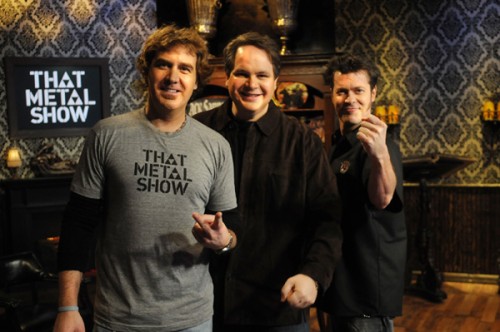 How did the network respond when you showed up with these profane, rough-edged Jersey boys and proposed them as your co-hosts?
How did the network respond when you showed up with these profane, rough-edged Jersey boys and proposed them as your co-hosts?
When I introduced Don and Jim to the network, they said “OK, this could work. Let’s do a pilot and let’s come up with some concepts and things to do.” So that’s how it all started. We shot that pilot in 2008 and here we are five years and a hundred episodes later and it’s been a phenomenal ride. If you’ve been watching, you seen how much we’ve evolved since the beginning; we started out as a half-hour show in New York and now we’re an hour show from L.A., and we’ve had a million different features come in and out, including stuff that’s happening in this new season, which is completely redone in terms of the set and some of the new features that we’re doing.
From a content level, you’ve flown quite an arc, starting from guests who were sort of well-known in the metal community but not really outside of that sphere. You’ve since featured some of the biggest names in rock and heavy metal history. Where do you go from here?
The changes that we’ve put in place for this current run of shows airing right now are pretty major. This is the most we’ve ever messed with it since it started. Yes, at the core it’s still the three of us talking to rock bands and having fun, but we have a bunch of new features that we’ll continue to roll out over this season, some of which haven’t even aired yet.
One of the things that we were all blown away by, that we took out in all but two episodes, was a Top Five list, which we used to open all the shows with. We just figured, “Well let’s rest that,” and in our first episode, we didn’t have a Top Five and people went crazy. We were like, “Really? That Top Five thing was that important?” But people went crazy because they wanted to scream and yell about our picks and make their own, and also quite honestly, because they wanted to see the Box of Junk girl, Jennifer, come out in one of her outfits.
So that’s all good. Whatever makes people happy and whatever keeps them watching. I just talked to my producer yesterday and he’s like, “OK, when we do these again, we should probably find a way to do Top Fives in every episode, because people really want that.” So we listen, we learn, we try things and some work, some don’t.
Going forward for me, the two things I’d personally love to see happen are bands playing on the show—where bands could actually play a song—and we can’t do that because we don’t have the money for publishing; and the other big thing I’d love to see happen is that we do new episodes more frequently. I wish we were on a new show every week and there were no downtimes, there were no months of repeats. But both of those issues that I mentioned all have the same problem, and that’s budget, and I don’t control that, the network does, so we’ll see where they want to go.
Viewers get to learn a lot about you three in your Top Five lists.
You’re right, it does show where we all come from, and it also shows who fully understood the question and who didn’t. (laughing) I still can’t believe that on last week’s show, Jim had Tom Morello as his number one underrated guitarist. I was like, “What? “I mean, Morello plays the Rock and Roll Hall of Fame every year, and he’s not even in it. I mean, I love Tom, but he’s at the top of Rolling Stone polls every year. He’s far from underrated.
Musicians, even the metal guys, can be colorful personalities to manage sometimes. Looking back over the past eleven seasons, are there any interviews or situations that you wish you might have handled differently?
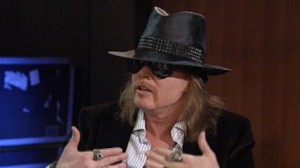 The one interview that I wish I had back was the Axl Rose interview, when we went to Miami and interviewed him. I only say that because people who don’t know the backstory behind that interview don’t realize all that went into getting it. It was a lot. It was waiting around, literally, for fifteen hours for that interview. And we never knew if we were ever going to get it. There was no promise made to us that we were going to get an interview, so we were prepared to some degree, but we weren’t prepared to wait until five in the morning to do an interview, and that’s exactly what it ended up being. We got to the arena at three o’clock the day before, and we walked out of the arena at around eight a.m. the next day. We got our interview, but as important as it was to have been the first—and all respect to Jimmy Kimmel, who I know got one—we were first to have gotten an interview with Axl on TV in God knows how long.
The one interview that I wish I had back was the Axl Rose interview, when we went to Miami and interviewed him. I only say that because people who don’t know the backstory behind that interview don’t realize all that went into getting it. It was a lot. It was waiting around, literally, for fifteen hours for that interview. And we never knew if we were ever going to get it. There was no promise made to us that we were going to get an interview, so we were prepared to some degree, but we weren’t prepared to wait until five in the morning to do an interview, and that’s exactly what it ended up being. We got to the arena at three o’clock the day before, and we walked out of the arena at around eight a.m. the next day. We got our interview, but as important as it was to have been the first—and all respect to Jimmy Kimmel, who I know got one—we were first to have gotten an interview with Axl on TV in God knows how long.
I remember running into you in L.A. a few weeks after that and you still looked exhausted.
We really put a lot into that and it took a hell of a long time to get it. To that end, by the time Axl came out and the interview happened, we were so sleep deprived, we were literally dozing off before he walked in. We had flights to catch. We thought we were going to do the interview at eight, get back to our rooms around eleven, sleep, wake up, get on the plane and go. We literally went from the venue to the airport, got on a plane and came home without sleeping.
So I’m not making excuses, but when you’re standing around that long in limbo, you have a completely different mindset going into that interview. You’re like, “OK, let’s get some time with this guy, and then we’ve gotta go.” There are much tougher questions that I could have asked. I think that the bigger part of that whole thing is that people just wanted to see the guy and hear him speak, because he’s so reclusive.
The whole thing was a weird thing. He didn’t know he was supposed to do an interview. His manager, he claims, didn’t tell him. We were there forever, so really it was a whole gray area going into it. Again, the most important thing was that we got it; people saw it, people heard it, most people liked it. That was the goal, to get him on the show, but we could have certainly done more with it if things had been different.
It’s a surreal piece of television. His answers probably revealed more about himself than he intended.
Listen, you have to realize, too, that you get a guy like that sitting there, you’ve waited all that time… You know that he can be volatile and you want to walk a tightrope because the last thing you want to do is, having sat there for fifteen hours with your crew, the first question out of your mouth is, “Dude, what’s wrong with you, man? Slash is the best! Are you crazy?” Which people, I think, expect.
I think there are certain elements that think the first question should be, “Put the original band back together!” How do you think that’s going to fly? Then the guy takes his microphone off and thirty seconds into it he walks out, and we’ve just spent fifteen hours for that. There’s got to be some tact. You’ve got to do what you can do to get into stuff without cutting the red wire and having somebody go crazy. So that’s a balancing act and I think that under the conditions, we all did a great job. Could it have been better? Yeah. So that’s one that I’d love to have back under different conditions.
Still, don’t you think that the circumstances surrounding the interview created a level of suspense and unpredictability that you might not have achieved in a studio?
What people don’t know also about that whole thing was that because we didn’t know if we were ever going to get an interview with him, before he even walked in, we interviewed everybody in Guns N’ Roses, including crew members, and we also interviewed everybody in Buckcherry, who were opening that show.
The reason we did that was because if Axl didn’t come out, we still needed to put an hour of TV on, so we were just going to cut it and it was going to become the Quest for Axl show, where we never really get him, but we talk to everybody around him.
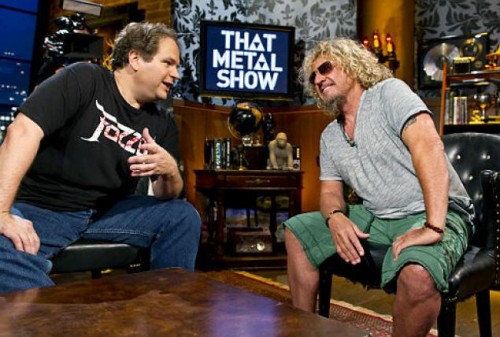 And then, when he shows up at the very end, just when we were ready to call it a day, all of that stuff was cut out, and left out. I get a lot of people asking me about (current Guns N’ Roses guitarist) DJ Ashba sitting there in the Axl interview and not saying anything. That’s because Axl wanted him sitting there, and all respect to DJ, who’s a friend, but if you have Axl Rose for the first time on TV in twenty years, you’re not going to talk to DJ Ashba. And DJ knew that. But we had interviewed DJ before, and again, that stuff ended up online, so that’s kind of one of these surreal moments that I could probably write a book about that episode alone.
And then, when he shows up at the very end, just when we were ready to call it a day, all of that stuff was cut out, and left out. I get a lot of people asking me about (current Guns N’ Roses guitarist) DJ Ashba sitting there in the Axl interview and not saying anything. That’s because Axl wanted him sitting there, and all respect to DJ, who’s a friend, but if you have Axl Rose for the first time on TV in twenty years, you’re not going to talk to DJ Ashba. And DJ knew that. But we had interviewed DJ before, and again, that stuff ended up online, so that’s kind of one of these surreal moments that I could probably write a book about that episode alone.
So to give a very long answer to your question, if I could go back and do a different kind of interview, I would probably go back and go for that.
Switching gears a bit, it’s now time for you to take ten hard ones.
Uh oh…
I’m going to give you ten either/or questions and I’d like you to choose one and briefly explain why you made that choice.
Alright.
Rob Halford or Bruce Dickinson?
Halford because he’s the metal god, simple as that. He came before Bruce, so maybe there wouldn’t have been a Bruce without a Halford, so I’ve got to go with Rob.
British Metal or US Metal?
Ugh… Gotta go British because to me, Black Sabbath is where heavy metal started, and they’re from England.
Scorpions or Anvil?
Scorpions. All respect to Anvil, but Scorpions have a much, much bigger catalog of songs.
Here’s a movie question: Almost Famous or Rock Star?
Almost Famous. I just think that it’s a better story and I think that from what I’ve heard, the original intent of Rock Star was originally to be based on the Judas Priest story, but it got turned a bit sideways, so I just think that Almost Famous was better done.
KISS in the 80s or KISS in the 90s?
I have to say 90s because in the 90s is when they reunited with the original band.
In that same vein, metal today or metal ten years ago?
I’m going to say metal now, because I think it’s further along, I think it’s grown and today, on the day that we’re talking, it was just announced that Black Sabbath have the number one album in America. So that’s pretty remarkable in 2013, so we’ve gotta go with now.
Front row or backstage?
Hmmm…Well, it depends what I’m looking to do! (laughing) If I’m looking to hang out, then backstage, but if I’m looking to see the show, front row. But I’ll tell you what, and here’s the secret that a lot of people don’t know about front row—front row is often a really bad seat. For the front row, the sound is usually really bad most of the time because you’re too close to the PA, where it’s almost behind you and you’re not hearing it right. Also, it’s hard to take in the whole show if the band has screens or production that you can’t see properly. So front row is not everything it’s cracked up to be, if you’ve ever been lucky enough to sit there. You’re better off being about fifteen rows back to really take in a full show.
Oh wow… Hmmm… (long pause) From an interviewer’s perspective, radio. Yeah, because I have so much more time. I love doing interviews and getting the stories from these bands. I love sitting for an hour straight and talking to an artist, and you simply can’t do that on television. From an impact standpoint, and a notoriety standpoint, without question television. But from a standpoint of doing interviews and getting into it with artists, radio. Plus radio is so much more immediate. Something I do on my radio show tomorrow night will be heard everywhere five seconds after I do it. TV, what I do there isn’t going to be seen or heard for a month after it’s done.
Sylvester Stallone or Bruce Willis?
Stallone. Because I like Rocky and Rambo a lot more than Die Hard.
OK, final one…
I should have said Willis because Willis is from New Jersey, but I’ve still got to go with Stallone.
You might have already answered the last question, but I’m going to ask it anyway. Sabbath or Zeppelin?
(long, long pause) Oh wow… Alright, I’m going to go with Zeppelin.
Wow.
Yeah, I’m gonna go with Zeppelin, and here’s the simple answer—there wouldn’t have been a Sabbath without a Zeppelin. And they’ve said that themselves, and I’ve just read a recent interview with Sabbath for their new album and they were asked, “What were you listening to that shaped the band?” and one of the bands they mentioned was Zeppelin. You’ve got to pay respect to the elders. Both of their music holds up incredibly well, both bands have so much dynamic in their sound.
The big difference of course is that Zeppelin has always been one band; Sabbath, are we talking Dio? Are we talking Ian Gillan? Are we talking Tony Martin? You can go on and on? If you’re just talking about the Ozzy years, it’s a different thing too, but I just always defer to the bands that came before and that laid the foundation when questions like that come up, and that’s Zeppelin before Sabbath.
Great talking to you, Eddie. Thanks for your time.
Thanks, Joe. It’s been a lot of fun.

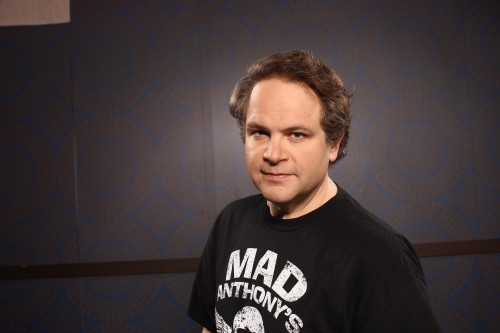
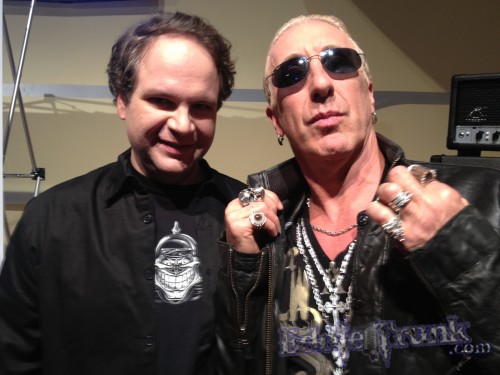
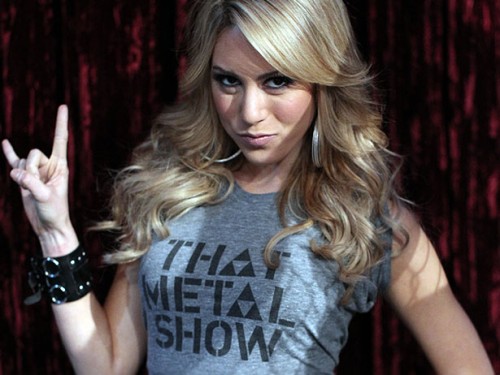


Wow. I like this. I’m not a huge Trunk fan, but the interview opened him up for me. Thanks Joe!!!
Thanks, Hank! I always enjoy talking to Eddie. One of these days I’m going to pin him down for an entire interview where we talk about sports or movies or something. Be fun to step outside of the usual field of play.
Digging the new season. But NOT digging the Wayne’s World approach to the introductions. Too cheesy. Love the questions you set up for each interviewee too!
When I was a kid they preached
that metal & metal heads were evil.
Ironic how it all turned out, huh?
Eddie’s a good guy, doing good things
for the metal community.